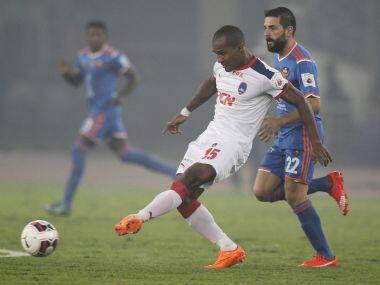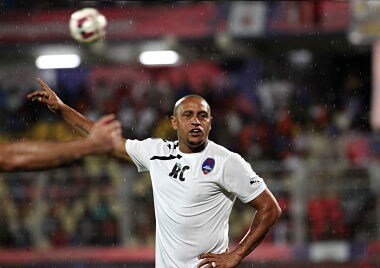FC Goa is the only team to beat Delhi Dynamos twice in the group stage. So confidence must be high among Zico’s wards, despite the 0-1 loss in the first leg of the Indian Super League semi-final. When Goa size up Delhi’s strengths and weaknesses, some notes must be high on the list – this is how they can beat Roberto Carlos’ men. Breaking down Delhi’s defence This is not something readily enforced; you need Delhi’s defence to have a bad day. Of the 20 goals Delhi conceded in the league stage, 11 were conceded in the four matches Delhi lost. Take out the three conceded against Kerala Blasters in a 3-3 draw, and you are left with six goals allowed in nine games. [caption id=“attachment_2545776” align=“alignleft” width=“380”]  Can Malouda and Co keep Goa at bay? Photo: ISL[/caption] This includes weathering two attacking sides that really stretched and pressured. In their home games against Northeast United and Atletico de Kolkata, Delhi had to face strong and skillful attackers who showed commitment and verve. Both teams tormented Delhi, stretching them wide; the attackers rotated positions with slick off-the-ball running. Yet Delhi managed to draw both the games, letting in only one goal on each occasion. John Arne Riise and Anas Edathodika have done quite well, with Chicao in front of them and goalkeeper Antonio Doblas behind them. Full-backs Souvik Chakraborty and ‘Adinga’ Ralte have had a good two months – the former in particular. In the games in which Delhi have lost, their defence has committed mistakes that seemed childish compared to its average performances. Goa won’t mind some off those mistakes. Souvik, Chicao and Sehnaj Singh seem ripe candidates for picking up two yellow cards in a tight game, given their propensity towards reckless challenges. Midfield: Where does Malouda play? Florent Malouda has been a standout player in the second season of ISL. A role model for the team, he is the de facto captain, regardless of who wears the armband. He has thrived with Chicao playing behind him, in a holding role. Delhi manager Roberto Carlos has used Malouda in two ways. Mostly, he has been used in a free-floating, attacking role. He has created plenty of chances and has eight assists. This has allowed Malouda to stretch wide when he wants to find space, and his attacking runs – particularly in the left channel – have provided some of Delhi’s best moments this season. If Goa want to beat Delhi, they will have to shackle the Frenchman – Zico had said after the previous match that he shifted to a defensive mindset (bringing on Bikramjit Singh) in the second half because he wanted someone to shadow-mark Malouda. He will need plans from the off in the coming match though. In some games, Carlos has used Malouda more centrally, alongside Chicao, in a role otherwise handled by either Hans Mulder or Sehnaj Singh. Malouda has helped control the game and orchestrated the transitions in this role. Given Malouda’s work rate, fitness and commitment, he will play well wherever the manager wants him. But one gets the feeling he is best used up front, in a more liberated role, not needing to worry about defensive duties – he tracks back regardless of his position, in the manner of a team player. Carlos’s attacking options The worrying thing about Malouda’s creative moves is that Delhi’s preferred striker Robin Singh does not seems to utilise them very well. Of the four goals Robin has scored this season, two have been headers and the other two have come from stray balls that came his way. He has not put Malouda’s silken service to good use. [caption id=“attachment_2477652” align=“alignright” width=“380”]  File picture of Roberto Carlos. ISL[/caption] Malouda seems to have more options when he has Richard Gadze and Adil Nabi to play with. Gadze is the most successful of Delhi’s attackers, for he has two assists to go along with the four goals he has scored. Given that he has been used as a substitute rather than the central striker, his success also show greater efficiency. He has shown strength in holding off defenders, as also positional skill and speed. Gustavo dos Santos has also provided speed and acceleration, but – like Robin – he has not made the best use of Malouda’s creativity. Wingers Francis Fernandes, ‘Len’ Doungel, Vinicius and Shylo ‘Mama’ have looked more comfortable around Malouda’s genius. One encouraging feature of Robin Singh has been his eagerness to track back, when he is not the most advanced, central striker. Clearly, he is not reluctant to put in the hard work; he has held up the ball well in attack, using his heft. And his poacher’s instincts have bailed out his team. He gives the team an aerial option, as Goa centre-back Lucio found out in the first leg of the semi-final – his aerial strength makes him useful while defending corners, too. When Malouda’s slick passing along the ground doesn’t work, Robin’s air superiority does help. One gets the feeling, however, that an opposing defence would rather defend against Robin than Gadze or Nabi. They need to mind his strength in the air and be careful about stray balls rolling in his direction inside the box. But Carlos is unlikely to change his attack too much. Don’t be surprised if he starts both Robin and Gadze, with Malouda right behind, and a more defensive central midfield of Chicao, Sehnaj AND Mulder. That’s when Goa will have problems. The curious case of Chicao In their first-leg of the semi-final, Delhi had clearly come with mindset of imposing on Goa, stifling their creativity. Goa’s creative director Joffre Mateu was fouled repeatedly. In the final tally, Delhi had 20 fouls against Goa’s 12 – and most of Goa’s replies came in the second half, as Goa tried to repeat its second-half blitz against Delhi in last league game. It did not come off. Delhi’s physicality kept Goa out of the game in the first half, and managed to hold them off in the second. Chicao was central to this. Just as Delhi look to Malouda for sparkling passes and fluid attacks, they look to Chicao for the muscle. He has been critical to Delhi’s success, because he also protects the defence. His reading of the game and positional intelligence has been crucial to Delhi’s success despite their negative goal difference. Chicao’s passes along the ground have not been anything to talk about. But his aerial, weighted balls show quality and experience. Robin’s goal against Goa in the first leg came off one such pass. Over the past two months, Chicao has consistently sent in dangerous lofted passes. Goa will be wary of those. But Chicao is slow and aging. He covers for it with his positioning. But any team that wants to beat this Delhi team will be looking to exploit Chicao’s lack of speed. He will be minding the guile of Goa’s attacking talent Joffre tonight. That will be the contest to watch. It may well settle the game.
When Goa size up Delhi’s strengths and weaknesses, some notes must be high on the list.
Advertisement
End of Article


)

)
)
)
)
)
)
)
)



